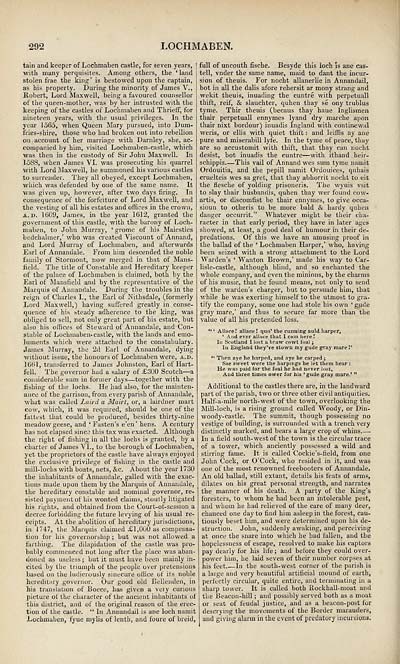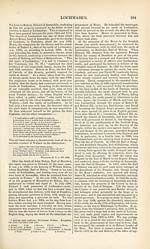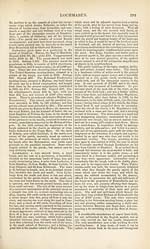Topographical, statistical, and historical gazetteer of Scotland > Volume 2
(306) Page 292
Download files
Complete book:
Individual page:
Thumbnail gallery: Grid view | List view

292
LOCHMABEN.
tain and keeper of Lochmaben castle, for seven years,
with many perquisites. Among others, the ' land
stolen frae the king' is bestowed upon the captain,
as his property. During the minority of James V.,
Robert, Lord Maxwell, being a favoured counsellor
of the queen-mother, was by her intrusted with the
keeping of the castles of Lochmaben and Thrieff, for
nineteen years, with the usual privileges. In the
year 15G5, when Queen Mary pursued, into Dum-
fries-shire, those who had broken out into rebellion
on account of her marriage with Darnley, she, ac-
companied by him, visited Lochmaben-castle, which
was then ill the custody of Sir John Maxwell. In
15SS, when James VI. was prosecuting his quarrel
with Lord Maxwell, he summoned his various castles
to surrender. They all obeyed, except Lochmaben,
which was defended by one of the same name. It
was given up, however, after two days firing. In
consequence of the forfeiture of Lord Maxwell, and
the vesting of all his estates and offices in the crown,
a.d. 1609, James, in the year 1612, granted the
government of this castle, with the barony of Loch-
maben, to John Murray, ' grome of his Maiesties
bedchalmer,' who was created Viscount of Annand,
and Lord Murray of Lochmaben, and afterwards
Earl of Annandale. From him descended the noble
family of Stormont, now merged in that of Mans-
field. The title of Constable and Hereditary keeper
of the palace of Lochmaben is claimed, both by the
Earl of Mansfield and by the representative of the
Marquis of Annandale. During the troubles in the
reign of Charles I., the Earl of Nithsdale, (formerly
Lord Maxwell,) having suffered greatly in conse-
quence of his steady adherence to the king, was
obliged to sell, not only great part of his estate, but
also his offices of Steward of Annandale, and Con-
stable of Lochmaben-castle, with the lands and emo-
luments which were attached to the constabulary.
James Murray, the 2d Earl of Annandale, dying
without issue, the honours of Lochmaben were, a.d.
1661, transferred to James Johnston, Earl of Hart-
fell. The governor had a salary of £300 Scotch — a
considerable sum in former days — together with the
fishing of the lochs. He had also, for the mainten-
ance of the garrison, from every parish of Annandale,
what was called Laird a Mairt, or, a lairdner mart
cow, which, it was required, should be one of the
fattest that could be produced, besides thirty-nine
meadow geese, and ' Fasten 's e'en ' hens. A century
has not elapsed sinca this tax was exacted. Although
the right of fishing in all the lochs is granted, by a
charter of James VI., to the borough of Lochmaben,
yet the proprietors of the castle have always enjoyed
the exclusive privilege of fishing in the castle and
mill-iochs with boats, nets, &c. About the year 1730
the inhabitants of Annandale, galled with the exac-
tions made upon them by the Marquis of Annandale,
the hereditary constable and nominal governor, re-
sisted payment of his wonted claims, stoutly litigated
his rights, and obtained from the Court-of-session a
decree forbidding the future levying of his usual re-
ceipts. At the abolition of hereditary jurisdictions,
in 1747, the Marquis claimed £1,000 as compensa-
tion for his governorship ; but was not allowed a
farthing. The dilapidation of the castle was pro-
bably commenced not long after the place was aban-
doned as useless; but it must have been mainly in-
cited by the triumph of the people over pretensions
based on the ludicrously sinecure office of its noble
hereditary governor. Our good old Bellenden, in
his translation of Boece, has given a very curious
picture of the character of the ancient inhabitants of
this district, and of the original reason of the erec-
tion of the castle. " In Annandail is ane loch namit
Lochmaben, fyue mylis of lentil, and foure of breid,
full of uncouth fische. Besyde this loch is ane cas-
tell, vnder the same name, maid to dant the incur-
sion of theuis. For nocht allanerlie in Annandail,
bot in all the dalis afore rehersit ar mony Strang and
wekit theuis, inuading the cuntre with perpetuall
thift, reif, & slauchter, quhen thay se ony trublu3
tyme. Thir theuis (becaus thay haue Inglismen
thair perpetuall ennymes lyand dry marche apon
thair nixt bordour) inuadis Ingland with continewal
weris, or ellis with quiet thift ; and leiffis ay ane
pure and miserabill lyfe. In the tyme of peace, thay
are so accustomit with thift, that thay can nocht
desist, bot inuadis the cuntre — with ithand heir-
schippis This vail of Annand wes sum tyme namit
Ordouitia, and the pepill namit Ordouices, quhais
cruelteis wes sa gret, that thay abhorrit nocht to eit
the fiesche of yolding prisoneris. The wyuis vsit
to slay thair husbandis, quhen thay wer found cow-
artis, or discomfist be tbair ennymes, to give occa-
sioun to otheris to be more bald & hardy quhen
danger occurrit." Whatever might be their cha-
racter in that early period, they have in later ages
showed, at least, a good deal of humour in their de-
predations. Of this we have an amusing proof in
the ballad of the ' Lochmaben Harper,' who, having
been seized with a strong attachment to the Lord
Warden's ' Wanton Brown,' made his way to Car-
lisle-castle, although blind, and so enchanted the
whole company, and even the minions, by the charms
of his music, that he found means, not only to send
of the warden's charger, but to persuade him, that
while he was exerting himself to the utmost to gra-
tify the company, some one had stole his own 'glide
gray mare,' and thus to secure far more than the
value of all his pretended loss.
" ' Atlace ! allace ! quo* the cunning auld harper,
1 And ever allace that I cam here !
In Scotland I lost a Draw enwt foal ;
in England they've stown my gude gray mare I'
" Then aye he harped, and aye he carped ;
Sae sweet were the harpmgs he let them hear :
He was paid for the foal he had never lust,
And three times ower for his 'gude gray mare.' "
Additional to the castles there are, in the landward
part of the parish, two or three other civil antiquities.
Half-a-mile north-west of the town, overlooking the
Mill-loch, is a rising ground called Woody, or Din-
woody-eastle. The summit, though possessing no
vestige of building, is surrounded with a trench very
distinctly marked, and bears a large crop of whins. —
In a field south-west of the town is the circular trace
of a tower, which anciently possessed a wild and
stirring fame. It is called Cockie's-field, from one
John Cock, or O'Cock, who resided in it, and was
one of the most renowned freebooters of Annandale.
An old ballad, still extant, details his feats of arms,
dilates on his great personal strength, and narrates
the manner of his death. A party of the King's
foresters, to whom he had been an intolerable pest,
and whom he had relieved of the care of many deer,
chanced one day to find him asleep in the forest, cau-
tiously beset him, and were determined upon his de-
struction. John, suddenly awaking, and perceiving
at once the snare into which he had fallen, and the
hopelessness of escape, resolved to make his captors
pay dearly for his life; and before they could over-
power him, he laid seven of their number corpses at
his feet In the south-west corner of the parish is
a large and very beautiful artificial mound of earth,
perfectly circular, quite entire, and terminating in a
sharp tower. It is called both Rockhall-moat and
the Beacon-hill ; and possibly served both as a moat
or seat of feudal justice, and as a beacon-post for
descrying the movements of the Border marauders,
and giving alarm in the event of predatory incursions.
LOCHMABEN.
tain and keeper of Lochmaben castle, for seven years,
with many perquisites. Among others, the ' land
stolen frae the king' is bestowed upon the captain,
as his property. During the minority of James V.,
Robert, Lord Maxwell, being a favoured counsellor
of the queen-mother, was by her intrusted with the
keeping of the castles of Lochmaben and Thrieff, for
nineteen years, with the usual privileges. In the
year 15G5, when Queen Mary pursued, into Dum-
fries-shire, those who had broken out into rebellion
on account of her marriage with Darnley, she, ac-
companied by him, visited Lochmaben-castle, which
was then ill the custody of Sir John Maxwell. In
15SS, when James VI. was prosecuting his quarrel
with Lord Maxwell, he summoned his various castles
to surrender. They all obeyed, except Lochmaben,
which was defended by one of the same name. It
was given up, however, after two days firing. In
consequence of the forfeiture of Lord Maxwell, and
the vesting of all his estates and offices in the crown,
a.d. 1609, James, in the year 1612, granted the
government of this castle, with the barony of Loch-
maben, to John Murray, ' grome of his Maiesties
bedchalmer,' who was created Viscount of Annand,
and Lord Murray of Lochmaben, and afterwards
Earl of Annandale. From him descended the noble
family of Stormont, now merged in that of Mans-
field. The title of Constable and Hereditary keeper
of the palace of Lochmaben is claimed, both by the
Earl of Mansfield and by the representative of the
Marquis of Annandale. During the troubles in the
reign of Charles I., the Earl of Nithsdale, (formerly
Lord Maxwell,) having suffered greatly in conse-
quence of his steady adherence to the king, was
obliged to sell, not only great part of his estate, but
also his offices of Steward of Annandale, and Con-
stable of Lochmaben-castle, with the lands and emo-
luments which were attached to the constabulary.
James Murray, the 2d Earl of Annandale, dying
without issue, the honours of Lochmaben were, a.d.
1661, transferred to James Johnston, Earl of Hart-
fell. The governor had a salary of £300 Scotch — a
considerable sum in former days — together with the
fishing of the lochs. He had also, for the mainten-
ance of the garrison, from every parish of Annandale,
what was called Laird a Mairt, or, a lairdner mart
cow, which, it was required, should be one of the
fattest that could be produced, besides thirty-nine
meadow geese, and ' Fasten 's e'en ' hens. A century
has not elapsed sinca this tax was exacted. Although
the right of fishing in all the lochs is granted, by a
charter of James VI., to the borough of Lochmaben,
yet the proprietors of the castle have always enjoyed
the exclusive privilege of fishing in the castle and
mill-iochs with boats, nets, &c. About the year 1730
the inhabitants of Annandale, galled with the exac-
tions made upon them by the Marquis of Annandale,
the hereditary constable and nominal governor, re-
sisted payment of his wonted claims, stoutly litigated
his rights, and obtained from the Court-of-session a
decree forbidding the future levying of his usual re-
ceipts. At the abolition of hereditary jurisdictions,
in 1747, the Marquis claimed £1,000 as compensa-
tion for his governorship ; but was not allowed a
farthing. The dilapidation of the castle was pro-
bably commenced not long after the place was aban-
doned as useless; but it must have been mainly in-
cited by the triumph of the people over pretensions
based on the ludicrously sinecure office of its noble
hereditary governor. Our good old Bellenden, in
his translation of Boece, has given a very curious
picture of the character of the ancient inhabitants of
this district, and of the original reason of the erec-
tion of the castle. " In Annandail is ane loch namit
Lochmaben, fyue mylis of lentil, and foure of breid,
full of uncouth fische. Besyde this loch is ane cas-
tell, vnder the same name, maid to dant the incur-
sion of theuis. For nocht allanerlie in Annandail,
bot in all the dalis afore rehersit ar mony Strang and
wekit theuis, inuading the cuntre with perpetuall
thift, reif, & slauchter, quhen thay se ony trublu3
tyme. Thir theuis (becaus thay haue Inglismen
thair perpetuall ennymes lyand dry marche apon
thair nixt bordour) inuadis Ingland with continewal
weris, or ellis with quiet thift ; and leiffis ay ane
pure and miserabill lyfe. In the tyme of peace, thay
are so accustomit with thift, that thay can nocht
desist, bot inuadis the cuntre — with ithand heir-
schippis This vail of Annand wes sum tyme namit
Ordouitia, and the pepill namit Ordouices, quhais
cruelteis wes sa gret, that thay abhorrit nocht to eit
the fiesche of yolding prisoneris. The wyuis vsit
to slay thair husbandis, quhen thay wer found cow-
artis, or discomfist be tbair ennymes, to give occa-
sioun to otheris to be more bald & hardy quhen
danger occurrit." Whatever might be their cha-
racter in that early period, they have in later ages
showed, at least, a good deal of humour in their de-
predations. Of this we have an amusing proof in
the ballad of the ' Lochmaben Harper,' who, having
been seized with a strong attachment to the Lord
Warden's ' Wanton Brown,' made his way to Car-
lisle-castle, although blind, and so enchanted the
whole company, and even the minions, by the charms
of his music, that he found means, not only to send
of the warden's charger, but to persuade him, that
while he was exerting himself to the utmost to gra-
tify the company, some one had stole his own 'glide
gray mare,' and thus to secure far more than the
value of all his pretended loss.
" ' Atlace ! allace ! quo* the cunning auld harper,
1 And ever allace that I cam here !
In Scotland I lost a Draw enwt foal ;
in England they've stown my gude gray mare I'
" Then aye he harped, and aye he carped ;
Sae sweet were the harpmgs he let them hear :
He was paid for the foal he had never lust,
And three times ower for his 'gude gray mare.' "
Additional to the castles there are, in the landward
part of the parish, two or three other civil antiquities.
Half-a-mile north-west of the town, overlooking the
Mill-loch, is a rising ground called Woody, or Din-
woody-eastle. The summit, though possessing no
vestige of building, is surrounded with a trench very
distinctly marked, and bears a large crop of whins. —
In a field south-west of the town is the circular trace
of a tower, which anciently possessed a wild and
stirring fame. It is called Cockie's-field, from one
John Cock, or O'Cock, who resided in it, and was
one of the most renowned freebooters of Annandale.
An old ballad, still extant, details his feats of arms,
dilates on his great personal strength, and narrates
the manner of his death. A party of the King's
foresters, to whom he had been an intolerable pest,
and whom he had relieved of the care of many deer,
chanced one day to find him asleep in the forest, cau-
tiously beset him, and were determined upon his de-
struction. John, suddenly awaking, and perceiving
at once the snare into which he had fallen, and the
hopelessness of escape, resolved to make his captors
pay dearly for his life; and before they could over-
power him, he laid seven of their number corpses at
his feet In the south-west corner of the parish is
a large and very beautiful artificial mound of earth,
perfectly circular, quite entire, and terminating in a
sharp tower. It is called both Rockhall-moat and
the Beacon-hill ; and possibly served both as a moat
or seat of feudal justice, and as a beacon-post for
descrying the movements of the Border marauders,
and giving alarm in the event of predatory incursions.
Set display mode to: Large image | Transcription
Images and transcriptions on this page, including medium image downloads, may be used under the Creative Commons Attribution 4.0 International Licence unless otherwise stated. ![]()
| Gazetteers of Scotland, 1803-1901 > Topographical, statistical, and historical gazetteer of Scotland > Volume 2 > (306) Page 292 |
|---|
| Permanent URL | https://digital.nls.uk/97497635 |
|---|
| Description | Volume second. I-Z. |
|---|---|
| Attribution and copyright: |
|

